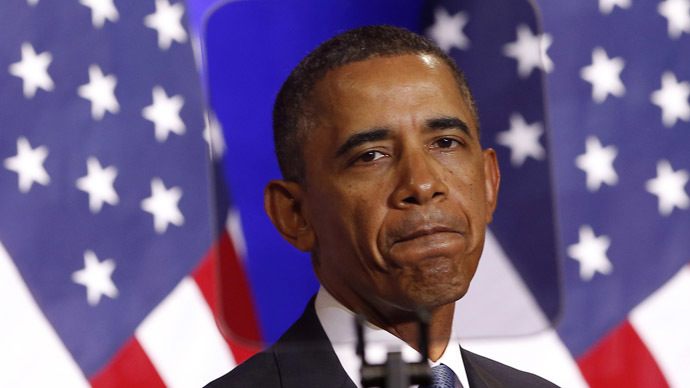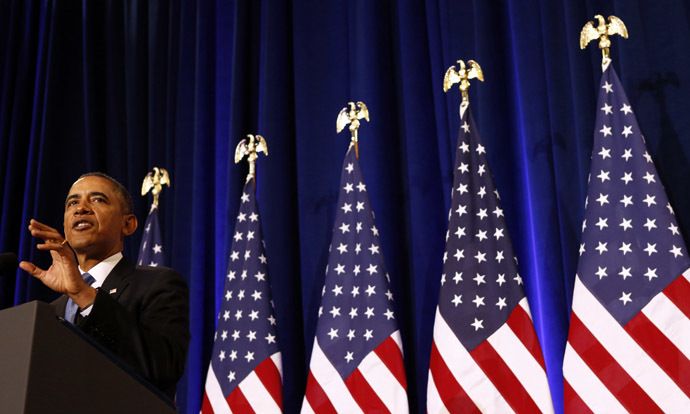President Obama’s NSA ‘ruse’

We were all looking at the president’s speech the wrong way.
It was billed as a major speech on reform to the nation’s intelligence programs. But although some genuine reforms were introduced, the speech really wasn’t about reform. It was about saving the NSA’s most controversial tactic, as revealed by Edward Snowden, which is to “collect it all.” Build the haystack, and then find the needle.
Of all the Snowden disclosures thus far, it’s the very first one that’s still most significant: the NSA is running a domestic spying program based on the collection and storage of virtually all Americans' telephone metadata.
The White House and spy chiefs deny it is a domestic spy program – a denial the President reiterated in his ‘reform’ speech. But their denials are belied by former CIA Director Michael Morrell, a member of the president’s own NSA review panel, who admitted to the Senate Judiciary Committee a few days before the speech, "There is quite a bit of content in metadata. When you have the records of the phone calls that a particular individual made, you can learn an awful lot about that person."
But here’s the thing about that program: it has an expiration date – something the White House was keenly aware of heading into the ‘reform’ speech.
Just as the telephone spying program is the most jaw-dropping NSA disclosure; it’s also the program most in peril. Already one federal court has ruled it likely unconstitutional. Back in July, the House of Representatives came within a handful of votes of killing the program – and that was before an entire autumn and now winter of more disclosures.
A prominent coalition of powerful Senators on both sides of the aisle is pushing to end the program, too. So there are a lot of pitchforks pointed at it.
Then there’s June 1, 2015, when Section 215 of the Patriot Act, which underpins the NSA’s telephone spying program, expires. Congress may not have the votes today to kill the telephone spying program. But, thanks to Edward Snowden, Congress almost certainly doesn’t have the votes next year to renew it either.
So that’s what President Obama, a fierce defender of the telephone spying program and Commander in Chief of the nation’s intelligence operations, was facing when he stepped to the podium in the Department of Justice’s Great Hall. And it’s why his ‘reform’ speech that followed was actually a Trojan horse containing a last-ditch effort to save the NSA’s “collect it all” telephone spying program.

A convenient distinction
Yes, the president said he is, “ordering a transition that will end the Section 215 bulk metadata program as it currently exists.” But he didn’t do that. Instead he took the primary concern of NSA critics, which is the collection and storage of Americans telephone data, and severed it in two, by focusing strictly on the storage of that data – not the collection of it.
He pushed for a tinkering of the program that would retain the bulk collection of Americans’ telephone (meta)data, but, “without the government holding this bulk metadata.” Instead, private telecoms or some sort of “third party” would retain the databases. It’s up to the attorney general, the intelligence community, and Congress ultimately to figure out how to make it work, which could be difficult since the telecoms don’t want this responsibility and it’s hard to imagine a trustworthy “third party” capable of retaining these databases, short of the ACLU or Electronic Frontier Foundation.
However, the important thing to remember is, no matter who’s holding the databases, those databases are still being filled with nearly every single American’s phone data. The government may have to deal with more restricted access to these databases in the short-term, and lose ownership of them altogether in the long-term, but indiscriminate bulk collection will continue indefinitely.
This convenient distinction wasn’t lost on those who know the NSA best and have blown the whistle on it. Speaking at the National Press Club within an hour of the President’s ‘reform’ speech, NSA whistleblower Kirk Wiebe called it a “ruse,” adding, “It’s not where the data is. It’s a red-herring to say if the NSA doesn’t have it, it’s safe. Not true.”
Another NSA whistleblower, Bill Binney, criticized the speech saying that any approach that “still maintains bulk collection is the wrong way to do it.” Yet that’s exactly the approach President Obama took – with good reason.

Cut off one hand to save the other
When US District Court Judge Richard Leon ruled against the telephone spying program, he argued, “I cannot imagine a more ‘indiscriminate’ and ‘arbitrary invasion’ than this systematic and high-tech collection and retention of personal data on virtually every single citizen for purposes of querying it and analyzing it without judicial approval.”
His key words: “collection and retention.” Does Judge Leon rule the same way if the ‘retention’ is taken out of the picture? That’s the gamble President Obama is making. By slicing off the NSA’s left hand of bulk retention, President Obama may just be able to save the right hand of bulk collection moving forward.
Not only might he have gotten the courts off his back by disavowing government storage of bulk data collection, but President Obama may have got Congress off his back, too. In the Senate, the lead lawmaker pushing for a complete undoing of the telephone spying program, Senator Patrick Leahy (D-VT), said following the speech that he wouldn’t fight the president on his reform proposals.
The chairwoman of the Senate Intelligence Committee, Senator Dianne Feinstein predicted after the speech that the telephone spying program will end up surviving. She told NBC, “The president has very clearly said that he wants to keep the capability…I know a dominant majority of the — everybody, virtually, except two or three - on the Senate Intelligence Committee would agree with that.” Her counterpart in the House Intelligence Committee, Rep. Mike Rogers (R-MI), echoed those sentiments.
Rep. Adam Schiff, a member of the House Intelligence Committee, took the bait as well and forecast that the bulk storage will “inexorably” end up in the hands of the telecoms. He said nothing about the ethics, efficacy, or constitutionality of bulk collection.
Edward Snowden and the journalists he’s working with critically wounded the NSA’s telephone spying program. Either by way of the courts or by way of Congress, the program was not going to survive in its current form. The President knew this, which is why he had to give his ‘reform’ speech.
If he really wanted to see the program terminated, he could have ended the bulk collection on his own without the approval of Congress. He could have ordered his spy agencies to no longer seek approval from the FISA court for the collection of everyone’s telephone data. And by ending bulk collection, the question of bulk storage would be settled, too.
But the president didn’t do that. Instead, he handed the wounded remains of the program back to Congress, where the NSA’s staunchest supporters are poised to reincarnate it before its old form expires.
A few cosmetic changes, maybe a new overseer of the databases, but ultimately, ‘collect it all’ spying has a better chance of surviving now than it did before the president’s speech.
The statements, views and opinions expressed in this column are solely those of the author and do not necessarily represent those of RT.
The statements, views and opinions expressed in this column are solely those of the author and do not necessarily represent those of RT.













